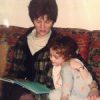I’ve been thinking about writing this blog for a while. A Mother’s Day blog. I’ve written and deleted sentences in my head. I’ve opened and closed Word. I’ve scrolled every single social media site… again, and again… and again. I’ve searched my past blogs for things I’ve written before, wondering if past-me had any words of wisdom past that I could use (she didn’t). It’s now the day before Mother’s Day and I’m yet to put pen to paper (or fingers to keyboard).
The words aren’t coming this year. On the surface of it – Mum’s dead. It’s crap. What more is there to say?
But I think those surface thoughts are just masking the fact that I do have things to say. I have so much to say and I know this because if I didn’t, I wouldn’t have this feeling that I need to blog. The problem is, the words are stuck. They’re joining the feelings in a place so squashed and so buried that I can’t access them.
It’s like when you have a bin, but the weather is grim so you don’t want to go outside and empty it. Instead, you squish down the stuff inside it to get more in so that you can hold off taking it outside for another day or two. But the weather doesn’t pick up for a while, so you keep squishing it down and shoving more in, until the day comes when you do want to empty it but you can’t, because everything’s stuck.
I don’t actually mind Mother’s Day itself. In some ways, it’s quite nice. Social media is filled with people celebrating their Mum’s, Grandma’s, and honorary Mum’s, and it can be really nice to see that. It’s a welcome break from the sheer number of depressing and frustrating news stories that often occupy my feeds.
I think the thing I find difficult is the expectation that I won’t be okay. That it will (and should) be difficult.
Some of this expectation comes from others. The posts on social media entitled ‘for those of you without Mum’s this Mother’s Day’, or ‘for those of you grieving’, or something like that. The tweets with helpline numbers. The kind and thoughtful messages from friends and family members letting me know that they’re thinking of me (thank you, lovely people!).
All are very well-meaning, but all are a reminder that while others can take their Mum out for a nice lunch, or buy them a box of chocolates, the life-to-death postal service isn’t currently in operation, so I can’t do those things.
Some of the ‘you should feel rubbish’ expectation comes from myself. I almost feel like if I don’t struggle with Mother’s Day, then it means that Mum wasn’t as much of a Mum as she might have been. It’s stupid, because how I feel or don’t feel on Mothering Sunday or any other Sunday of the year has no bearing on what Mum meant to me, how Mum was as a Mum, or anything much else related to our relationship.
Tomorrow is just another day. It’s 24 hours and it will pass just like every other 24 hours does. I won’t be buying any chocolates, sending a card, or going out for any meals. I’ll remember Mum, I’m sure. But I remember Mum every single day, because she was a big part of my life for 21 years, and has continued to be part of my life since she died.
To those of us who do find Mother’s Day difficult, please try and up the self-care a little bit. To those of us who don’t have a Mum we can take out, but aren’t really struggling with the fact it’s Mother’s Day – please remember that it’s okay. It’s okay to feel okay. (It’s okay not to feel okay). To everyone else – celebrate your Mum. Give her a hug. Send her a happy text. Have a lovely Sunday.










